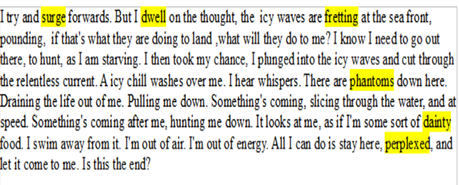
Week from 27th April to 1st May 2020
This Week's Activities:
Instructions are in RED
Reminder - All those Lexia users should be logging on from home and working through those level now. Its an ideal opportunity to improve your reading and spelling skills. Lets get to that level 18.
Friday 1st May:

1. Writing :
The Loch Ness Monster:
A Factual Documentary
T
What would happen if Richard Attenborough arrived at Loch Ness for a special edition of the Blue Plant and captured a wonderful film of the elusive monster?
Well, I'd imagine he would write an engaging commentary to go with the film to be watched by millions on tv.
That's your job today - to write the words to go with the film I've found for you - which currently has no commentary to go with it.
To begin with, it would be very useful to see how the master does it: Davis Attenborough. So I've included a first link to watch a clip from the Blue Planet - Blue Whale.
Task 1:
Watch the Blue Planet clip and take note about how he describe the creatures in an intersting, engaging way - comparing their size to dinosaurs , and not just reeling off boring facts - he makes his commentary engaging, with feeling and wonder, and raises questions.
Watch the MP4 Blue Planet Clip here
Task 2:
I've written a similar version of his words here, to help you see how you should write your Nessie version. Here's two extract s from the whole comentary to give you n idea..
Dwarfed by the vast expanse of the open ocean, glides the largest animal that has ever lived on our planet: a blue whale....
Swimming alongside this majestic creature and looking into one of its eyes, one gains an overwhelming feeling of real intelligence – a whale will examine you carefully, although it can only view in monochrome (shades of grey). This gentle leviathan cannot, as one may presume, live indefinitely below the waves: it is a mammal and thus needs air to breath. There are few more awesome sights than that of the blue whale breaking through the surface, expelling a plume of water from its blow-hole.
Click here for my full version of the commentary
Task 3:
Your Commentary Checklist to Follow:
Write your own commentary for the Nessie film below, using your own ideas from this week of how your creatures lives and behaves in Loch Ness.
- It starts with a great opening, to draw you in..
- It's all in the PRESENT tense.
- It is factual but not boring
- It uses quality, precise vocabulary - it doesn't just say
'The whale is blue. The whale weighs 200 tonnes'.
- It writes with care and a passion about the subject.
- It uses sophisticated conjunctions (although, however,
despite)
Now click on the movie (.mp4) frame below to watch
the film you need to write a commentary to:
Have a look at OR's great piece of commentary
completed today (01.05.2020)
Thursday 30th April:

1. Writing and Vocabulary:
1. Some very interesting comprehensions (A Sumuggler's Song and The Listeners) again revealed lots of new , ambitious vocabulary for us to store up in our vocabulalry box in our brain. Some of the words are quite tricky, so challenge yourself and learn some great new powerful words.
Your task:
1. Choose 6 words from the list below.
.- you can use either of the two versions.
2. Write down the word, followed by what it means - its definition. Get used to using a real dictionary if you have one - if you haven't got one at homee, you could use an online dictionary.
Challlenge 1:
Write a sentence using the word in its correct context.- so it makes sense in the situation you are writing about and you are using the correct meaning of the word.
Challenge 2:
Write a complex sentence, using linking punctuation ( ; - :), or a great conjunction (have a lok at yesterdays grammar task) and using the word in its correct context.
Challenge 3:
When you have finished writing the definitions, include as many of the words as you can in one short paragraph based around our topic: Under the Sea: Mysteries of the Deep.
Obviously you will be using a full range of punctuation to help really say what you mean to say.
Have a look at WO's - this is the quality we are looking for:

| mindful | fret / fretted | dainty |
| awaken / awakened | perpex / perplexed | phantom |
| dwell / dwelt | crop / cropping / cropped | surge / surged |
| throng / thronging | hearken / hearkening |
Wednesday 29th April:

1. Reading:
For those with Stage 3 Essential Texts: Essential Ts:
Mark yesterday's comprehension
The answers for A Smuggler's Song are available here.
For those with Stage 4 Essential Texts: Essential Ts:
Mark yesterday's comprehension
The answers for The Listeners are available here.
Green Group:
(Your 'The Hero' answers will be available tomorrow)

2. Grammar Revision
We haven't been concentrating on grammar for a while, and we've been doing a lot of writing in the last two weeks so today we'll have a go at our favourite grammar quizes.
Jot the question number and answer down in your book, unless you can print it out. I've provided an additional answer sheet so you can mark it later- don't be tempted to look first - see how much you have remembered..
1. Have a go at the Conjunctions quiz paper.
If you need some refreshing on conjunctions, click here to go to Espresso and login with
2. Here are the answer to Conjunctions
Tuesday 28th April:

1. Reading:
Red and Green Group:
(Your parents will know if you are in these groups)
Your comprehension to day is 'The Hero':
Click here to download 'The Hero'
For those with Stage 3 Essential Texts: Essential Ts:
Answer the following questions in full sentences.
A Smuggler's Song (Page 48).
The answers will be available tomorrow for marking.
(Click here if you want to download a pdf version of the questions)
1. What is the reader told not to do at the start of the poem?
2. How many smugglers are riding past the house?
3. What have the smugglers hidden around the back of the house which you are asked to cover up if you find it?
4. What might your mother have to fix for the smugglers?
5. What does ‘mindful’ mean at the top of page 2.
6. Who are Trusty and Pincher?
7. What do Trusty and Pincher know what to do when the smugglers pass by outside at night.
8. If you help keeping the secret that the smugglers have been, what reward might you receive?
9. What other presents do the smugglers bring for people in the town – you may need to find out what ‘Baccy’ is.
10. What two pieces of advice are given to persuade the reader not to pay attention to what the smugglers are up to.
11. Challenge question: Why does the poem seem to be about doing everything to pretend the smugglers haven’t been seen, and why wouldn’t the people in the town want to tell King George’s soldiers about the smugglers?
-- For those with Stage 4 Essential Texts: Essential Ts:
Answer the following questions in full sentences.
The Listeners (Page 44).
Today's poem is very strange and mysterious. Walter de la Mare published "The Listeners" in 1912. It remains one of his most famous pieces of writing, and reflects the author's fascination with mystery - but what do you think its about?
The answers will be available tomorrow for marking.
(Click here if you want to download a pdf version of the questions)
1. Although we don’t know the Traveller’s real name, why might the word traveller have a capital letter in the poem?
- 2. Find and copy the great triple alliteration in the first ten lines – what is it?
- 3. ‘But only a host of phantom listeners…’ – what does this mean?
- 4. It say they stood ‘thronging… on the stair’ – explain what this could mean in this poem( you may need to look up the definition of thronging).
- 5. Explain in your own words what the Travellers horse was doing after he called into the house; don’t just copy the line out.
- 6. The poem uses a very unusual word – smote- which we rarely see used. Find out what it means and find the present tense of ‘smote’’..
- 7. Find and copy the great triple alliteration in the last ten lines – what is it?
- 8. Is there a pattern in this poem? If there is, how would you describe it?
- 9. Challenge Question: Lots of people have commented on what they think this poem is actually about. Write a brief summary of what you feel the real story is. Why is the man there? Why does he get no answer? Is there someone in the house or not- and why don’t they answer?
- 10. Challenge Question: It has been said that this poem is a metaphor for man’s attempts to contact extra-terrestrial life in the universe. Can you explain how the ideas in this poem could suggest this?
- 11. Background Research: The search for extra-terrestrial life project on earth is called SETI; can you write a few lines about what this is and what they do?
Monday 27th April:

1. Creative Writing:
This week, we are going to work some more on expanding our penportrait of Katrina into a full biography - but today we are going to start the week off with some pure imagination. It;s time to visit the Literacy Shed again, today using a Music Video called 'Language' by Porter Robinson.
Note: When you click on the LANGUAGE link, it is the video AFTER ;the 'Titanium' video - there is a big black screen but the title will come up when you click play on iit.
If you want to download all these instructions and my poem, click on this link for a pdf version.


